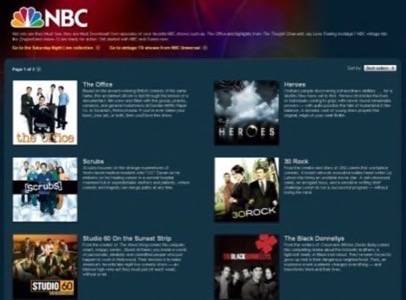Internet TV is on a roll today! For starters, the day began with Apple sending out emails to their Season Pass subscribers, offering them credits for missed episodes. Later on, there was breaking news from the OMMA Global Hollywood conference, an industry event dedicated to online media, marketing, and advertising – it seems that CBS wants to change the game and have online video consumption contribute to a show’s ratings. Well, it’s about time!

Apple Does the Right Thing – Gives Customers Credits
For some, today’s big Apple news may be the release of Safari 3.1, but for others it’s going to be the email from Apple that showed up in their inboxes this morning. The email informs Apple Season Pass subscribers that they will receive credit for the episodes they missed due to the Hollywood writer’s strike.
According to the email, Apple will provide for the following:
- Any additional episodes broadcast for the 2007-2008 season will still arrive as iTunes receives them (I’m taking this to mean that they will still arrive, even if the season would have normally ended by now.)
- If the season winds up with fewer episodes than planned, a partial credit will be given for the difference.
- A credit for two free videos has been applied, which can be used for any two TV episodes, music videos, or short films on the iTunes Store.
So, not only will customers receive partial credits for their losses, they’re also receiving bonus credits just because of the inconvenience caused by the strike, something which wasn’t even Apple’s fault. That’s great customer service and sure to please Apple’s customers.
CBS Shocker – Internet TV Viewing Should Count
Big media has been somewhat slow to change, but today’s CBS news shows a promising shift for the television industry. Patrick Keane, Vice President and Chief Marketing Officer for CBS Interactive, proposed a move to an aggregate ratings system, which would combine TV viewing with online video consumption. These combined ratings could then provide advertisers with a cross-platform option that is more detailed in terms of data, thanks to online metrics.
Keane cited internet darling “Jericho” as an example: the online viewers of one episode boosted the ratings from 4.2 to 5.1 – nearly a whole percentage point. Although Keane didn’t mention the online campaign that did, in fact, save Jericho from cancellation, had these online ratings been taken into account from the beginning, desperate measures by hardcore fans would never have been needed.
Internet fans save Jericho

Another example Keane used was this year’s Grammys. TV viewers accounted for 16.9 million of the viewers for the annual music awards show – down 15% from the previous year. But taking into account the web viewers, an additional 7.9 video streams could be added to that number, as well as 4.9 million page views, making the decline in viewership not as bad as previously thought.
Getting With the Program
As a correlation to yesterday’s article (reading isn’t down, it just moved online), it goes to reason that other activities have made the move online, too. More people are watching both TV and movies online as well as on portable devices. And while shows may suffer a little in number of live “real-time” viewers, why wouldn’t the networks count all of a show’s viewers towards the popularity of that program?
This shift has been a long time in the making; it was late fall of 2006 that should have been the wake-up call for TV broadcasters when a struggling new show called “The Office” was saved from cancellation after being put on iTunes. The show, which quickly became the number one downloaded show, surprised the NBC execs who realized that there actually was an audience for the program – they just happened to be online.
NBC’s save of “The Office” may have been a turning point which prompted the networks to begin offering their content on iTunes, and on their own web sites as well. Unfortunately, it appears that even now, in 2008, the networks are still trying to figure out how to make the online viewings count for something.
“The Office” on iTunes

However, with today’s news, not to mention the launch of sophisticated and well-executed sites like NBC/Universal’s Hulu.com, it seems the networks are finally starting to figure what the pirates have known for years: the internet was made for content and it’s what the people want. No matter what, the move to online media will change the television industry forever, so it’s promising to see them headed in the right direction.

















